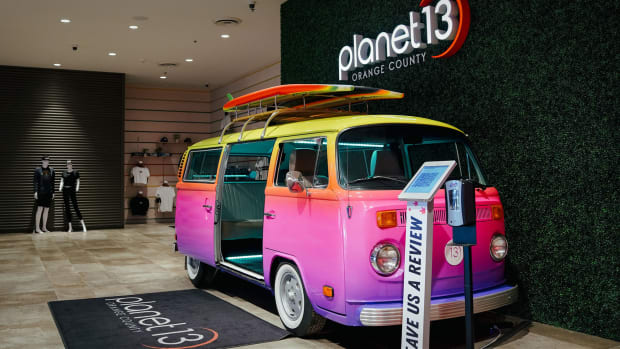
An incumbent business usually fights any effort that would open it up to competition.
That makes economic sense, and at the federal level alcohol has a monopoly on mind- and mood-altering substances that are legal to buy.
Never mind the argument that alcohol is every bit as dangerous as many substances that we don't allow people to legally use recreationally. It's legal, so that question has been settled. That gives producers of liquor, beer, and wine a massive advantage over those in the legal cannabis industry.
DON'T MISS: Las Vegas, Las Vegas Strip Have An Unexpected Cannabis Problem
If cannabis gets legalized on a national level, it in theory becomes more of a competitor to alcohol than it already is. In Las Vegas, for example, cannabis-consumption lounges are coming soon but are not allowed to serve alcohol.
In fact, Planet 13 (PLNHF) , Las Vegas' largest dispensary, voluntarily gave up its liquor license so it could open a cannabis-consumption lounge, If people are consuming cannabis, they're probably not drinking.
Nonetheless, a leading alcohol-industry trade association has come out in favor of federally legalizing marijuana and has sent a letter to Congress asking it to make that happen.

Planet 13
Wine & Spirits Wholesalers of America Want Legal Pot
Alcohol trade group Wine & Spirits Wholesalers of America favors legalizing cannabis. The group wants it to be regulated in the same way alcohol is. The letter sent to Congress explains what the group is asking for.
We have reached this position because the current conflict between state and federal law is not only causing adverse consequences for consumers and non-consumers of cannabis but will also have long-term public health and safety costs that are too great to ignore. Twenty-one states and the District of Columbia -- representing roughly half the U.S. population -- have already legalized adult-use cannabis, yet the markets in these states remain illegal under federal legislation. This conflict undermines the rule of law and weakens public health and safety, while leaving states unsupported in their efforts to create safe, regulated markets and eliminate dangerous black-market activity.
More important than the trade group calling for legalization is that it's essentially asking Congress to put alcohol and cannabis on the same level. In many ways, that would at least level the playing field and create a more clear competition.
The current federal system for the regulation of alcohol serves as a strong model for the structure that should be enacted for cannabis. This system is rooted in the principle that states are the primary regulator of a socially sensitive product but are supported by a strong federal system that regulates the production and interstate movement of the product. During and immediately after Prohibition, a significant black market existed for alcohol products. It was cooperation between state and federal regulators that effectively ended that black market and created a legal alcohol marketplace that has evolved into the global standard for consumer safety, marketplace competition, and product diversification -- all of which provide benefits to the public.
Congress has never shown any interest in taking up legalization efforts. That goes even for the Senate, which is currently controlled by the Democratic Party and is generally considered more liberal on cannabis-related issues, In fact, Congress has passed on numerous opportunities to set federal guidelines for the sale of cannabidiol.
Trade Group Still Wants States to Make Decisions
The letter from the trade group is looking to set a federal framework for cannabis -- it's not looking to take away a state's right to decide whether to allow legal cannabis consumption. In many ways, that mirrors alcohol laws, where rules vary by state and some states have so-called dry areas where alcohol is not sold.
"States should maintain the flexibility to legalize -- or not legalize -- cannabis within their borders. They should also be able to regulate the production, distribution, and sale of the product in the manner that best suits each state -- just as they do for alcohol," the trade association sent in its letter.
In addition, the trade association wants Congress to make sweeping changes and not take a piecemeal approach to regulation.
"Federal legalization should be done comprehensively, not incrementally. And it should be accompanied by the creation of a robust federal regulatory structure that licenses producers, testing facilities, and distributors. Doing so will ensure product integrity, establish appropriate tax and trade practice requirements, and protect public safety, while providing leeway for states to tailor additional requirements in these areas to suit local needs," wrote the WSWA.
The trade association also shared four policy principles that it believes should guide federal regulation of cannabis.
These principles are rooted in four pillars:
- The federal permitting of cannabis producers, importers, testing facilities, and distributors.
- Federal approval and regulation of cannabis products.
- Efficient federal tax collection.
- Effective federal guidelines and other measures to protect public health and safety.
"Ultimately, we believe that the societal cost of inaction is too great and that the time has come for Congress to act," the letter stated.







